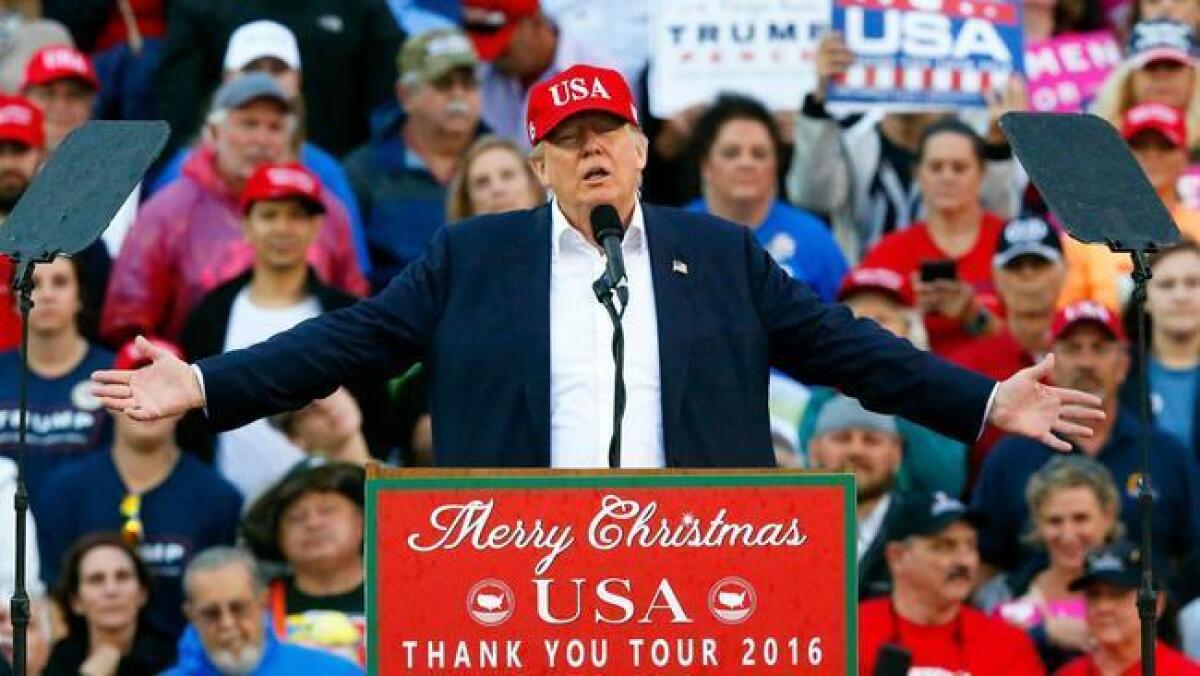Opinion: Trump isn’t the GOP’s king, but is it OK if Jesus is?

- Share via
Detractors of Donald Trump could hardly believe their luck. Here, it seemed, was a Christmas statement from the Republican National Committee that seemed to be referring to the president-elect as a “king.”
The statement contained this paragraph:
“Merry Christmas to all! Over two millennia ago, a new hope was born into the world, a Savior who would offer the promise of salvation to all mankind. Just as the three wise men did on that night, this Christmas heralds a time to celebrate the good news of a new King.”
I had Twitter open after the statement’s release, and watched amazed as one critic after another suggested that the RNC message was exulting in the Parousia of King Trump. (Look it up.)
It struck me as the latest example of Trump Derangement Syndrome. But the Trump team felt obligated to rebut the extreme interpretation of the GOP Christmas card. Sean Spicer, the incoming White House press secretary, tweeted:
“Christ is the King. He was born today so we could be saved. It’s sad & disappointing you are politicizing such a holy day.”
But Spicer’s riposte reminded me that the RNC’s message was problematic in a different way. OK, the “king” is not Trump but Jesus; but why would a political party that aims to appeal to all Americans endorse the Christian claim that Jesus was both king and Savior?
And that’s pretty clearly what it does. Compare the more guarded statement issued by the RNC in honor of Hanukkah, which begins: “As our Jewish friends and family around the country gather to light the first candle, we hope they will enjoy a special time of closeness and joy this Hanukkah season.” (Our friends are Jewish, it seems to be saying, but we aren’t.)
Or contrast the more ecumenical wording of this Christmas greeting from the Obamas:
“Today, like millions of Americans and Christians around the world, our family celebrates the birth of Jesus and the values He lived in his own life: Treating one another with love and compassion. Caring for those on society’s margins: the sick and the hungry, the poor and the persecuted, the stranger in need of shelter — or simply an act of kindness.”
Note that Obama says that he and his family – Christians, despite what you may have heard – are celebrating Christmas. He isn’t speaking for the Democratic Party. And then he focuses on Jesus’ message (the so-called “social gospel” that can be practiced by believers and nonbelievers alike) rather than any metaphysical claims.
If this seems like nitpicking, consider one of Trump’s major “issues,” the supposed war on Christmas.
During the Wisconsin portion of his victory lap, the president-elect reminded supporters that “when I started 18 months ago, I told my first crowd in Wisconsin that we are going to come back here someday and we are going to say Merry Christmas again. Merry Christmas”
Of course, Trump as president can’t make people say “Merry Christmas” instead of “Happy Holidays.” Moreover, as Washington Post columnist E.J. Dionne pointed out the other day: “Long before Trump came along we were entirely free to say ‘Merry Christmas’ to each other. Our political leaders could say it, too.”
But let’s follow the advice of some pundits and take Trump’s “Merry Christmas” rhetoric not literally but seriously. What was he trying to say? I think it’s not too big a leap to interpret his advocacy of “Merry Christmas” as an assertion of what a lot of people of his age and background consider obvious: that America is a Christian country, even though others sorts of people happily live here.
This isn’t an opinion confined to conservatives or Christians. In 1983, this newspaper published a column by Michael Kinsley questioning the ACLU’s litigation over nativity scenes displayed on public property. Kinsley quoted from an ACLU legal brief that complained that “a child whose family does not believe in the divinity of Christ must view the public crèche as a symbolic representation of his or her status as an outsider. The child will question ... his identification with the American culture.”
Kinsley’s response:
“I think that’s right. But I also think that this child had better learn early on to question his identification with the American culture, because it’s a tough question that will follow him all his life no matter how successful the ACLU is in banning nativity scenes. There is a majority culture in this country. It is Christian, white, middle-class. Jews and non-believers (I am both) are outsiders to some extent in that culture. So are blacks, homosexuals, Asians and so on.”
Kinsley went on to suggest a silver lining: “Far from being a handicap, a sense of ‘outsiderness’ can be an asset in a society that does in the end try to protect the rights of cultural outsiders. It energizes, promotes skepticism, gives perspective.”
I’m not sure Kinsley would write in this way in 2016, when America is less Christian, white and middle-class than it was in 1983.
But I think the sentiments he expressed then illuminate both Trump’s exasperation at hearing “Happy Holidays” instead of “Merry Christmas” and the reason why some people at the RNC might find it bizarre that I would be questioning whether a political party that includes a lot of Christians should be hailing Jesus as king.
Follow the Opinion section on Twitter @latimesopinion and Facebook
More to Read
A cure for the common opinion
Get thought-provoking perspectives with our weekly newsletter.
You may occasionally receive promotional content from the Los Angeles Times.











